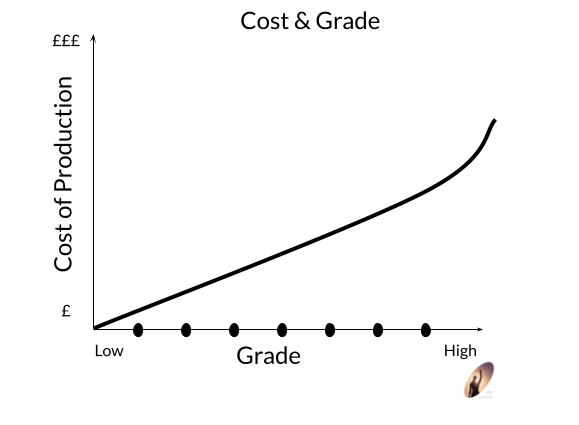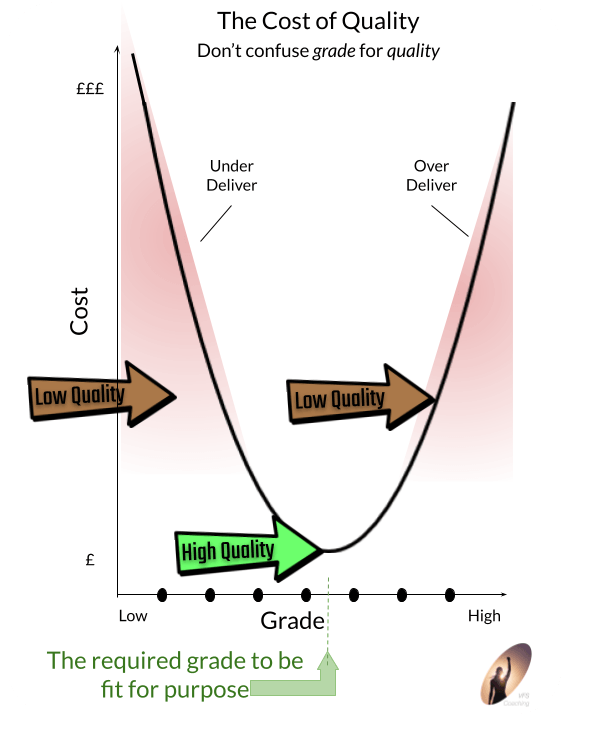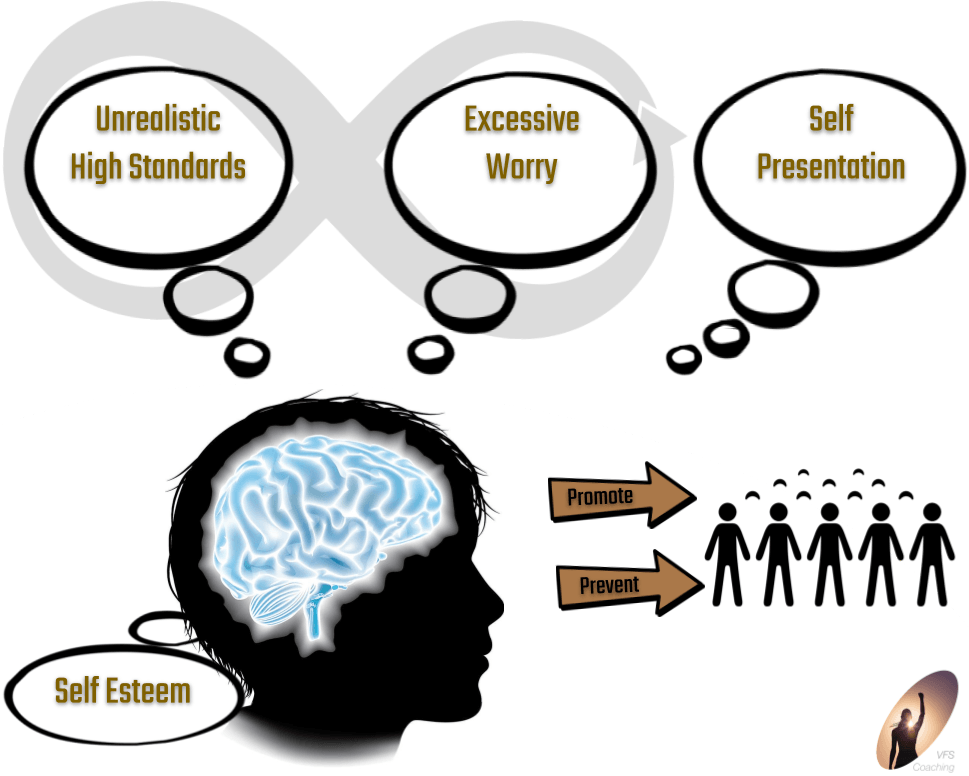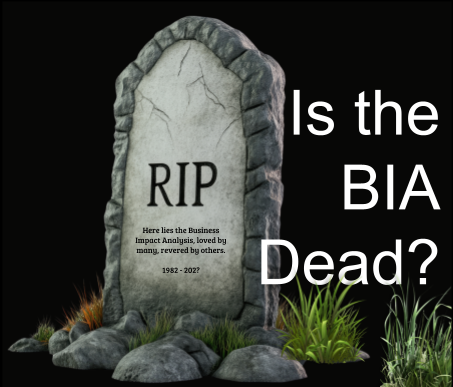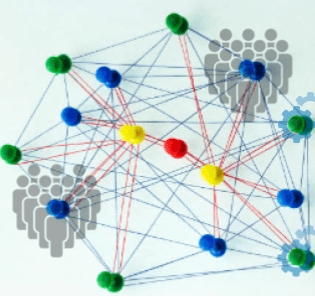I want to overcome the negative impacts of unhealthy perfectionism
Thanks to our friends from the VFS Performance Coaching practice for this article.
VFS Coaching
6 Minute Read
This is part 2 of a 2 part series.
In
part 1 of this short series on Perfectionism we explored what perfection is from a clinical psychologist’s perspective and looked at how it drives high standards which can lead to excessive worry and a low self-esteem. In this second and final part, we will look at more side-effects of perfectionism in the forms of procrastination and burnout, before exploring ways to overcome it.
So without further ado, let’s dive into it.
Procrastination
Procrastination is common among perfectionists (Stoeber, 2018). Along with tackling other counterproductive behaviours, we may suggest that you self-monitor behaviour and thoughts linked to procrastination, such as obstructing or delaying tasks.
As we’ve seen, perfectionistic-concerns generate a gap between a person’s actual and ideal self. This sense of falling short leads them to put off until tomorrow what they could get done today (Smith, Sherry, Saklofske, & Mushqaush, 2017).
Other studies, particularly in sports, have found that perfectionists are also more likely to experience a fear of failure (Correia, 2018). Procrastination may be a response to concerns regarding making mistakes or performing poorly.
Procrastination is one of the main contributors to performance levels. We all do it from time to time. The two most important points are 1, to recognise when it’s happening and 2, to know how to overcome it. Perfectionism is only one of many causes of procrastination.
Burnout
Burnout is a “psychosocial syndrome that is associated with motivational, performance, and psychological difficulties” and has three core symptoms (Hill & Curran, 2015, p. 1):
- Emotional exhaustion
A general feeling of being overstretched due to excessive demands.
- Impersonal or cynical attitude
A sense of indifference or detachment from others or the environment.
- Reduced sense of competence or accomplishment
The higher the sense of incompetence or failure, the more burned out the individual.
Perfectionism gets in the way of successfully managing our workload and can sometimes be a factor in burnout. Excessively high standards may mean perfectionists are less successful at delegating, prioritising, and even saying no, leading to a higher volume of tasks (Harvard Business Review, 2021).
Possibly because of its negative effect on motivation, perfectionism is associated with burnout and its symptoms (Hill & Curran, 2015).
If you suspect that you may be suffering from burnout, it may be worthwhile identifying your degree of perfectionism.
So, how do we overcome perfectionism?
We are undoubtedly living in a time when we are inundated with images and information like never before. Comparing ourselves to others or to the unrealistic targets from social media, high-pressure workplaces, and demanding educational standards. So how do we manage the need to always do better?
There are ways to combat our desire for perfection. For some, depending on how you are feeling and acting, self-help books may be sufficient. Others may need talking therapies or Cognitive-Behavioural Therapy (CBT) to break out of negative thinking patterns (Thomson, 2019).
Clinical perfectionism is often best treated with CBT.
This first step involves educating the person about the difference between useful and clinical perfectionism, the damaging aspects of clinical perfectionism, and how it can actually make it less likely people will achieve their goals.
Therapists encourage clients to experiment with different ways of approaching their goals, and to have flexible standards and self-compassion rather than self-criticism. They also try to eliminate procrastination and avoidance.
Former clinical psychologist Alice Boyes suggests focusing on aspects of perfectionism and their potential solutions on a day-to-day basis. The following two approaches can help you overcome perfectionism in (and outside of) the workplace and ultimately get what is really needed done (modified from Boyes, 2020):
- Re-assign tasks
Perfectionists can find it difficult to let go of control; they don’t want to hand over work for fear that it will not be done properly, or because it feels like some admission of failure that you can’t do it yourself.
Learn to enjoy handing over tasks to other people and being relieved of the decision-making burden. Ask yourself: Would my time be better spent elsewhere? Could someone else step up and be accountable for this task?
- Stop over-delivering
It can be tempting to think, “If I’m not over-delivering, I’m under-delivering.” This is unlikely. If given time, resources, and payment to complete a piece of work, perform it well, but your standards and time investment should not be disproportionate to its value.
Recognise that a client may not expect you to reply within two hours. Depending on the task, try to focus on areas where you can add the most value according to the time and resources agreed.
Essentially, these are about
balance. High standards are required in almost all jobs, but they have to be realistic, and you need to be aware that mistakes can lead to development and growth.
At VFS Consulting we spend a lot of time with businesses and their employees helping them to understand quality and what high and low quality is. Quality is how well something fulfils its intended purpose, meeting the requirements and producing something of the correct grade. For example, whilst some luxury goods last longer or perform better, mostly they simply cost more to make because they use higher grade materials or employ more manual input. They do not necessarily function any better than a less expensive alternative… they are no more fit-for-purpose, just more expensive.
In technology you may hear the term “over-engineered” which generally means that something is too complex, too highly spec’d and as a result more expensive that it needs to be. It is of high grade but of no higher quality.
So you see that high grade and high quality aren’t the same.
For perfectionists, it's useful to consider that an appropriate level of quality considers the costs, the time and the grade of the output.
What other techniques can I consider?
The following interventions and exercises go deeper, exploring how we can change the beliefs associated with avoiding setting impossible-to-maintain standards.
Your Lifestyle
5 tips to dilute perfectionism and boost self-esteem
1. Acknowledge any perfectionistic traits
Frankly acknowledge that perfectionism is not doing you any favours. In fact, it is actually preventing you from feeling joy and satisfaction from your achievements. Predominantly, you are likely feeling a failure from not meeting your own expectations. How often can you realistically achieve perfection? 1-5% maybe? There is significant room for fruitless berating of yourself for the other 95-99%.
2. Understand your emotions and what drives your unhealthy perfectionism
Understand where the early perfectionist messages are rooted. What experiences have contributed to you believing that you have to be perfect? Write this down in a journal and begin to view it from a new and different perspective. Consider the types of authority figure you would have liked to have had in early life. What kind of qualities would they have demonstrated to support you in feeling encouraged, accepted and wholly good enough?
3. Recalibrate
Question your beliefs about needing to please, perfect or appease others in your life today. Will you really be rejected for not being perfect? Do people care as much as you think? Often, we are placing far more pressure on ourselves than others ever would do. People often prefer someone who is real, genuine and imperfect. Perfectionism can lead to competitiveness, rigidity and a lack of personal warmth which can be off-putting.
Allow your perfectionistic strivings to aim for honesty, to be honest with yourself and work on achieving an
accurate representation of what is an acceptable level of competence to portray and embrace being
authentic.
4. See Social Media content for what it really is
Be mindful of your social media usage. If you are comparing yourself and feeling low, then take a step back. Observe the images that are presented with a critical eye. This is just a snap-shot of someone’s life and is not the day-in-day-out real-life story. Understandably, people will post their best photos, accompanied by a favourable filter. How can you compare yourself to these? You can also reduce your social media engagement if you find this triggering.
Of course, comparisons don’t just happen on social media, and comparing & contrasting two similar things can be a useful approach for assessing differences. But it is unlikely that you are comparing apples with apples.
5. Focus on
your Qualities & Strengths
We are all flawed human beings with our strengths and weaknesses. No-one, yes, no-one has it all sorted out! Remember this, when you are tempted to idealise someone and assume they have it all together. There may be aspects of another that you wish to emulate or aspire to, but no-one is faultless. Instead, focus inwards and notice your own positive qualities and strengths. This is not about being arrogant, but rather having a quiet, inner acknowledgement and acceptance of the things you can do well. Jotting these thoughts down in a journal can be helpful, enabling you to begin to shift your focus. If you have a performance coach, ask them to work with you on this. If not and you're struggling with this exercise, ask a friend whom you trust to give feedback to you.
If you are struggling to control your inner perfectionist and are longing to feel self-acceptance, now could be the time to reach out and get support through our performance & wellbeing coaching. You can read more about
focussing on your strengths.
Considering your Personal Strengths Profile
At
VFS Coaching we use the VIA Character Strengths research programme to underpin this area of Positive Psychology that is at the heart of our coaching. If you're not currently or have not been a coaching client of ours, you can skip this section.
Whilst character strengths were not conclusive in terms of diagnosing perfectionism, some interesting correlations have been identified:
- Perfectionistic strivings were explained by the optimal use of
spirituality and infrequent underuse of
perseverance and
prudence.
- Perfectionistic concerns related to the overuse of
humility, underuse of
hope and
humour alongside a lack of optimal
self-regulation.
Consider exploring this topic with your coach to identify opportunities to improve your performance and wellbeing. We have interactive tools on the Members area of the VFS Coaching site that can help you explore this. It is a fully personalised experience if you enter your PSP Code.
So, to summarise both articles:
- There is healthy and unhealthy perfectionism
- Typically a person will tend to have either healthy of unhealthy perfectionism but not a balanced mix of both
- It can cause excessive worry and anxiety -
perfectionistic-concerns generate a gap between a person’s actual and ideal self
- Procrastination, low Self-Esteem and Burnout are common symptoms
- Clinical perfectionism is often best treated with Cognitive-Behavioural Therapy
- Other, more easily achievable personal actions in the workplace include:
- Reassigning tasks (and learn to see this as a responsible thing to do)
- Stop over-delivering (it doesn't mean your under-delivering and see this as delivering high quality)
- Outside of work:
- Acknowledge if you have perfectionistic traits and how they are not actually helping you achieve of feel good
- Be aware of your time on social media and in-particular avoid making unrealistic comparisons
- Focus on your strengths
Download Summary Poster
References
Antony, M. M., & Swinson, R. P. (2009). When perfect isn’t good enough: Strategies for coping with perfectionism. New Harbinger.
Boyes, A. (2020). Don’t let perfection be the enemy of productivity. Harvard Business Review. Retrieved August 24, 2021, from https://hbr.org/2020/03/dont-let-perfection-be-the-enemy-of-productivity
Correia, M. E. (2018). Fear of failure and perfectionism in sport. Cuadernos de Psicología del Deporte, 18(1), 161–172.
Frost R. O., Marten P., Lahart C., Rosenblate R. (1990). The dimensions of perfectionism. Cogn. Ther. Res. 14 449–468. 10.1007/BF01172967
Hill RW, Huelsman TJ, Furr RM, Kibler J, Vicente BB, Kennedy CJ (2004. A new measure of perfectionism: the Perfectionism Inventory. )Pers Assess. 2004 Feb; 82(1):80-91.
Hill, A. P., & Curran, T. (2015). Multidimensional perfectionism and burnout. Personality and Social Psychology Review, 20(3), 269–288.
Rogers, C. R. (1959). A theory of therapy, personality, and interpersonal relationships: As developed in the client-centered framework. In S. Koch (Ed.), Psychology: A study of a science: Vol. 3. Formulations of the person and the social context (pp. 184–256). McGraw-Hill.
Smith, M. M., Sherry, S. B., Saklofske, D. H., & Mushqaush, A. R. (2017). Clarifying the perfectionism-procrastination relationship using a 7-day, 14-occasion daily diary study. Personality and Individual Differences, 112, 117–123.
Slaney R. B., Rice K. G., Mobley M., Trippi J., Ashby J. S. (2001). The revised almost perfect scale. Meas. Eval. Couns. Dev. 34 130–145.
Smith, B.J. (2020). Can Perfectionistic Strivings be healthy? The association between Perfectionism, Character Strength Use and Flourishing.
https://dissertations.library.lincoln.ac.uk/893
Stoeber, J. (2018). The psychology of perfectionism: Theory, research, applications. Routledge, Taylor & Francis Group.
Note: Some of this content has been adapted from positivepsychology.com


